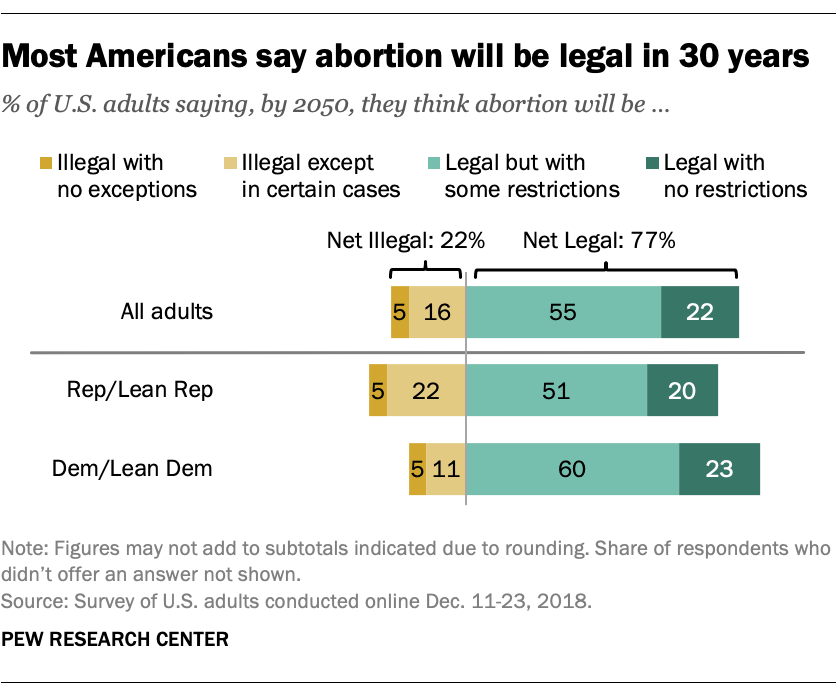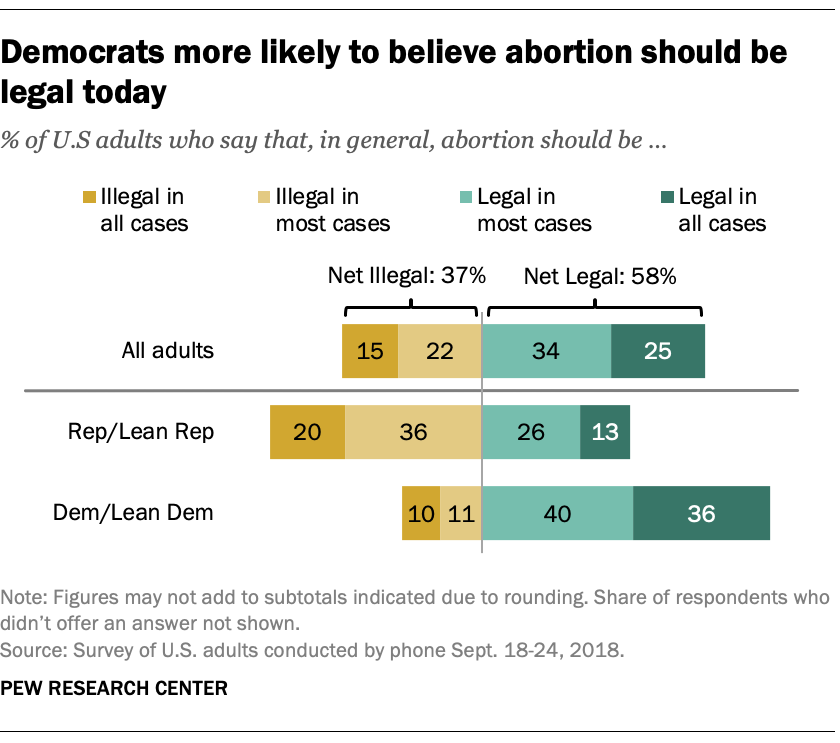The recent passage of several highly restrictive abortion bills in Alabama, Georgia, Ohio and Missouri has led to increased speculation about the future of abortion access in the United States. When asked about the future of abortion last December – before these states acted – about three-in-four Americans said that, in 2050, abortion will either be legal but with some restrictions (55%) or legal with no restrictions (22%), a Pew Research Center survey found.
 About one-in-five said abortion will be illegal 30 years from now, with 16% saying it will be illegal except in certain cases and 5% saying it will be illegal with no exceptions.
About one-in-five said abortion will be illegal 30 years from now, with 16% saying it will be illegal except in certain cases and 5% saying it will be illegal with no exceptions.
Some of the sponsors of the state anti-abortion measures see them as potential test cases that could bring the issue to the U.S. Supreme Court and lead to a reconsideration of Roe v. Wade, the landmark 1973 abortion decision.
Views about the future of abortion do not necessarily mirror Americans’ current beliefs about whether abortion should be legal or illegal. A separate, September 2018 survey by the Center found that a majority (58%) of the public said abortion should be legal in all or most cases, compared with 37% who said it should be illegal in all or most cases.
The issue of abortion has sharply divided the public for decades, especially along party lines. But predictions about the future of abortion laws are less polarized than views about whether abortion should or should not be legal.
 Most Democrats and those who lean to the Democratic Party (83%) said that abortion will be legal in 2050. By comparison, 71% of Republicans and Republican-leaning adults said the same. When it comes to their views on whether abortion should be legal, 76% of Democrats thought abortion should be legal in all or most cases, as did 39% of Republicans. A narrow majority of Republicans (55%) said abortion should be illegal in all or most cases; 21% of Democrats said the same.
Most Democrats and those who lean to the Democratic Party (83%) said that abortion will be legal in 2050. By comparison, 71% of Republicans and Republican-leaning adults said the same. When it comes to their views on whether abortion should be legal, 76% of Democrats thought abortion should be legal in all or most cases, as did 39% of Republicans. A narrow majority of Republicans (55%) said abortion should be illegal in all or most cases; 21% of Democrats said the same.
Americans also have strong opinions about which political party could do a better job of dealing with policies on abortion and contraception: Half said Democrats could do a better job, while only 31% had more confidence in Republicans, according to a June 2018 survey. Again, these views are strongly linked to partisanship: 75% of Democrats said the Democratic Party could do a better a job, while 57% of Republicans said the GOP could do better.
Opinions about the future of abortion also are associated with people’s religious beliefs. One-quarter (24%) of white evangelical Protestants said abortion will be legal with no restrictions in 30 years, and 15% of white mainline Protestants agreed. On the opposite end of the spectrum, black Protestants were more likely (12%) than white evangelicals (4%) and Catholics (4%) to say that abortion will be illegal with no exceptions in 2050. Of those with no religious affiliation, 61% said abortion will be legal with some restrictions in 2050, compared with 49% of all Protestants.
Alongside political and religious beliefs, educational attainment is linked to people’s predictions about the future of abortion. About two-thirds (64%) of Americans with a college degree or higher said that abortion will be legal with some restrictions in 2050, compared with 47% of people with a high school degree or less.
While abortion is often seen as a women’s issue, views about the current and future state of abortion law are not strongly linked with gender. Women and men have consistently expressed similar preferences on what abortion law should be: In 2018, 60% of women and 57% of men said abortion should be legal in all or most cases. And looking to the future, 78% of men and 76% of women said abortion will be legal in 2050.



